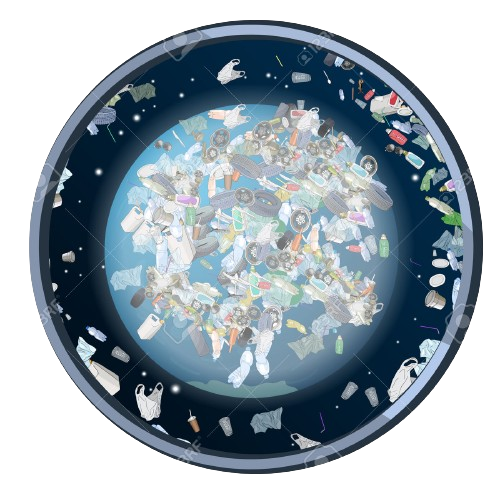Finding Hope In Garbagetown

This book is beautifully written and it has stuck in my head long after finishing it. :: Ah, the Fuckwit world! So modern, so dead. Gone too soon, and all that’s left is blue. Which is just fine by Tetley Abednego, thank you very much. See, the world she lives in, the one left behind after the Fuckwits fucked off and died, it’s absolutely beautiful. Garbage as far as the eye can see and all of it wonderful. Garbagetown is a massive patch of floating garbage in the sea, going from place to place, while beneath it the old world sleeps, lost in rising waters and a whole lot of complaining. The people in Garbagetown complain too, but Tetley doesn’t know why. Everything is perfect, even when it isn’t.
In Catherynne M. Valente’s The Past Is Red, Tetley is our bubbly guide to the world left over from the apocalypse, our cheery, goodhearted narrator who can only see the silver linings of the grey skies of Garbagetown and never met a lily she couldn’t gild. In her unique, engaging voice, Valente brings us into a future that is blue, describes the red world that came before it, and ultimately, tries to give us a little bittersweet satisfaction, since hope might be a little scarce.
Valente’s earlier novelette “The Future Is Blue” (originally published in Jonathan Strahan’s Drowned Worlds anthology) introduced us to Tetley and her story of Garbagetown, its grace and its beauty, so enamored by the shine of her future even as everyone who lives in Garbagetown is incredibly mad at her. She is beaten, she is scorned, she is everything-short-of-murdered, but still, the smile doesn’t leave her face, not as long as she has Garbagetown. Valente takes us through her bildungsroman in miniature, the trials and travails of Garbagetown, the love for her brother Maruchan, how they got their names, her first love, and the gleaming Electric City, the only place in Garbagetown with power. More importantly, she tells us what she did to make the whole world angry with her. It has a lot to do with hope and a lot to do with fear, and a little to do with sorrow, as many mourn the world that was, the world of the Fuckwits, and anyway, Tetley was only trying to help.
The novelette ended there, and the bittersweet ending burned like a sun. As Valente acknowledges in the Afterword, there was still more of Tetley’s story to tell—a seed planted to emerge later, green, tender, and just as full of fragile hope that it could flourish between the pill bottles and discarded plastic and warped tin of Garbagetown—and that’s exactly the magic she pulls off in The Past Is Red. We meet Tetley again, a little older, a little more weathered by the world, but her love for Garbagetown has never been stronger.
The Past Is Red is a different beast than “The Future Is Blue,” and Valente embraces that in her kaleidoscopic, lush, and generous writing. This Tetley feels older; she knows more of the world and the people that live in it, and she isn’t so hungry for adventure or whimsy. Rather, her hunger is something a bit more universal: companionship, care, tenderness, and even just a little understanding. Her time in exile hasn’t been kind to her and anyone else would be bitter, cruel, or plain mean. But Tetley is still just as bright, just as loving of Garbagetown and the treasures she finds within its depths, just as caring of the things that need a little care. If she’s a little bruised, a little hesitant to trust, a little less carefree and a bit steelier, we can only chalk this up to being older and learning fast.
But even if some of Tetley’s innocence is gone, her wonder hasn’t left her, and Valente truly cuts loose when faced with the expanse of Tetley’s world. With a longer page count than “The Future Is Blue,” Valente brings us vivid descriptions of Garbagetown’s other districts, sprawling with the abandoned, the lost, the trash and the treasure fused into one gorgeous world that we can’t help but love through Tetley’s eyes. Valente takes her time, giving us a more grounded picture of what exactly will be left when the world is gone, and you’ll grin or sob, recognizing this and that, seeing the truth behind someone’s vaunted saint, or what the symbol on a bottle means, or used to mean, when it was our world, the Fuckwit’s world. And I don’t want to say too much, but several key discoveries along Tetley’s journey reveals some rather interesting answers to the lingering questions of “The Future Is Blue,” and the emotional gut-punch of this entire book is found in the last few pages, as Tetley comes to terms with the world, and how she’ll spend her tomorrows, after she learns the real truth of the Fuckwits and how they left.
The Past Is Red was a joy to read, and that’s not often a description given to something seemingly dystopic. But that’s just how it looks from the outside. With Tetley as our guide, readers won’t be able to help but to see the beauty in crumpled, faded CVS receipts, the glint of amber light through a broken beer bottle in the afternoon sun, the intrinsic wonder of tarnished pennies. Valente infuses Tetley’s voice with so much warmth and hope, so much joy as she lives in a world that she knows is beautiful, that you will know it’s beautiful, too. A staggering commentary on climate change, the social order, the cycle of stories that are recycled as much as Garbagetown itself, and a voice that is singular, unique, and loving, The Past Is Red is a gift for readers of science fiction, so go ahead and treat yourself. And if one day you throw it away, Tetley will smile, knowing it will end up exactly where it needs to be.